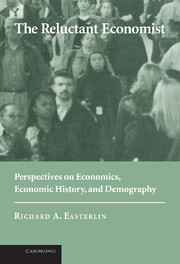Book contents
- Frontmatter
- Contents
- List of Tables and Figures
- Preface
- Acknowledgments
- PART ONE ECONOMICS
- PART TWO ECONOMIC HISTORY
- PART THREE DEMOGRAPHY
- 8 An Economic Framework for Fertility Analysis
- 9 New Perspectives on the Demographic Transition
- 10 Does Human Fertility Adjust to the Environment? Population Change and Farm Settlement in the Northern United States
- 11 America's Baby Boom and Bust, 1940–1980: Causes and Consequences
- 12 Preferences and Prices in Choice of Career: The Switch to Business
- Epilogue
- Bibliography
- Index
10 - Does Human Fertility Adjust to the Environment? Population Change and Farm Settlement in the Northern United States
Published online by Cambridge University Press: 03 December 2009
- Frontmatter
- Contents
- List of Tables and Figures
- Preface
- Acknowledgments
- PART ONE ECONOMICS
- PART TWO ECONOMIC HISTORY
- PART THREE DEMOGRAPHY
- 8 An Economic Framework for Fertility Analysis
- 9 New Perspectives on the Demographic Transition
- 10 Does Human Fertility Adjust to the Environment? Population Change and Farm Settlement in the Northern United States
- 11 America's Baby Boom and Bust, 1940–1980: Causes and Consequences
- 12 Preferences and Prices in Choice of Career: The Switch to Business
- Epilogue
- Bibliography
- Index
Summary
In the year 1770, I purchased some lands in the county of …, which I intended for one of my sons; and was obliged to go there in order to see them properly surveyed and marked out: the soil is good, but the country has a very wild aspect. However, I observed with pleasure, the land sells very fast; and I am in hopes when the lad gets a wife, it will be a well-settled decent country. Agreeable to our customs, which indeed are those of nature, it is our duty to provide for our eldest children while we live, in order that our homesteads may be left to the youngest, who are the most helpless. Some people are apt to regard the portions given to daughters as so much lost to the family; but this is selfish, and is not agreeable to my way of thinking; they cannot work as men do; they marry young: I have given an honest European a farm to till for himself, rent free, provided he clears an acre of swamp every year, and that he quits it whenever my daughter shall marry. It will procure her a substantial husband, a good farmer – and that is all my ambition.
J. Hector St. John de Crèvecoeur, Letters from an American FarmerFirmly rooted in the Malthusian origins of economists' views on population is the idea that population expands to fill up empty land until the exhaustion of cultivable soil brings population increase to a halt.
- Type
- Chapter
- Information
- The Reluctant EconomistPerspectives on Economics, Economic History, and Demography, pp. 184 - 204Publisher: Cambridge University PressPrint publication year: 2004



